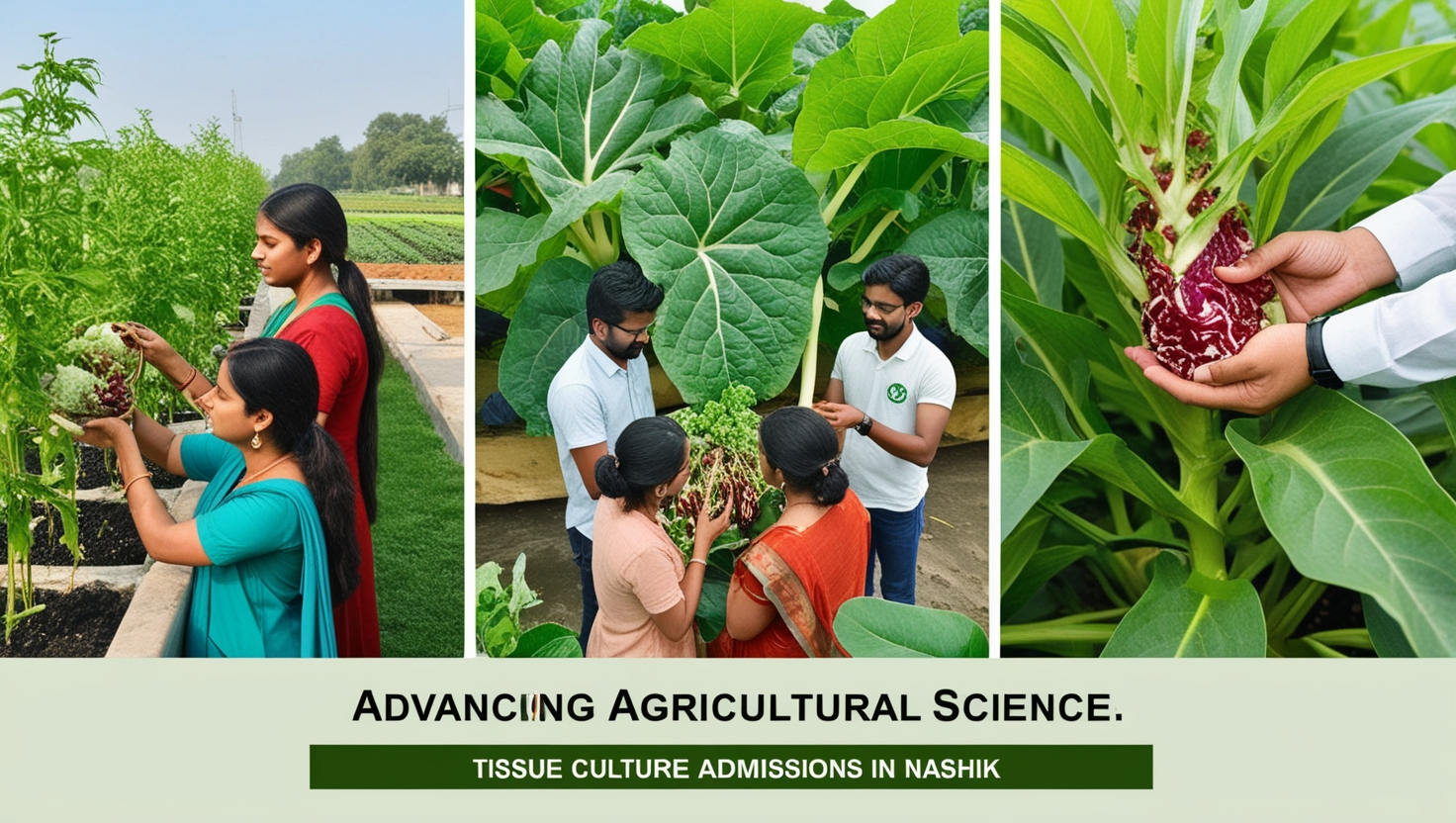Introduction:
In recent years, Nashik has emerged as a hub for agricultural innovation and education, particularly in tissue culture. With its unique combination of academic institutions, progressive farming practices, and access to cutting-edge biotechnology, the city offers unparalleled opportunities for aspiring students. Tissue culture course admissions in Nashik have gained significant attention as more individuals recognize the critical role of plant tissue culture in modern agriculture and biotechnology.
Understanding Tissue Culture and Its Importance
Tissue culture is a sophisticated biotechnological method that involves growing plant cells, tissues, or organs under sterile conditions on a nutrient medium. This technique is widely used for cloning plants, producing disease-free stock, and conserving rare species. The relevance of tissue culture extends beyond agriculture, impacting horticulture, forestry, and even pharmaceuticals.
Given its applications, the demand for skilled professionals in tissue culture is rising. Nashik is at the forefront of this trend with its fertile lands and advanced agricultural research centers. Tissue culture course admissions in Nashik provide students with the opportunity to gain theoretical knowledge and practical skills, ensuring they are well-prepared for careers in this dynamic field.
The Growing Popularity of Tissue Culture Courses in Nashik
The increasing popularity of tissue culture course admissions in Nashik can be attributed to several factors. Firstly, Nashik’s proximity to agricultural hubs and its reputation for producing high-quality crops, such as grapes and onions, make it a natural choice for students interested in agricultural sciences. Secondly, the city’s institutions offer specialized courses that cater to the evolving needs of the industry.
Institutes in Nashik emphasize hands-on training, enabling students to work in state-of-the-art laboratories with advanced tools. This practical approach is a significant draw for those seeking tissue culture course admissions in Nashik, as it ensures that graduates are industry-ready upon completing their studies.
Key Institutions Offering Tissue Culture Courses
Several prestigious institutions in Nashik provide comprehensive tissue culture programs. These courses are designed to cover fundamental and advanced topics, such as micropropagation, somatic embryogenesis, and cryopreservation. Tissue culture course admissions in Nashik are competitive, reflecting the high demand for these programs.
Many institutes collaborate with agricultural research organizations and biotechnology companies, offering students exposure to real-world applications. Such partnerships enhance the learning experience and increase the employability of graduates. Prospective students are encouraged to explore these institutions’ admission requirements, curriculum details, and facilities to make informed decisions about tissue culture course admissions in Nashik.
The Admission Process and Eligibility
The tissue culture course admissions process in Nashik typically involves submitting an application, meeting specific academic prerequisites, and passing an entrance examination or interview. Most programs require candidates to have a biology, agriculture, or biotechnology background. Additionally, some institutes may prioritize applicants with prior laboratory experience or a strong interest in plant sciences.
The admission timeline varies across institutions, so prospective students should keep track of application deadlines and required documents. Tissue culture course admissions in Nashik are highly sought after, and early preparation is crucial for securing a spot in these esteemed programs.
Career Opportunities for Graduates
Graduates who complete tissue culture courses in Nashik are well-positioned for diverse career paths. Tissue culture techniques are in high demand across multiple sectors, including agriculture, horticulture, and environmental conservation. Tissue culture course admissions in Nashik prepare students for roles such as laboratory technicians, research scientists, quality control analysts, and production managers in tissue culture facilities.
Additionally, graduates can contribute to sustainable agriculture by developing disease-resistant and high-yield crops. The skills acquired through tissue culture courses also open doors to entrepreneurial ventures, such as establishing plant nurseries or consulting services. Students pursuing tissue culture course admissions in Nashik can be pivotal in addressing global food security challenges.
The Role of Nashik in Promoting Agricultural Biotechnology
Nashik’s strategic location and agricultural heritage make it an ideal center for advancing tissue culture education. The city’s institutions attract local students as well as candidates from across India and abroad. Tissue culture course admissions in Nashik are part of a broader effort to enhance agricultural productivity and sustainability through scientific innovation.
Supporting government initiatives and private sector investments further strengthens Nashik’s position as a leader in agricultural biotechnology. The city ensures that tissue culture education remains relevant and impactful by fostering collaborations between academia, industry, and farmers. Tissue culture course admissions in Nashik thus represent an essential step toward building a skilled workforce capable of driving agricultural transformation.
Challenges and Future Prospects
While tissue culture course admissions in Nashik offer numerous benefits, there are challenges to address. Limited awareness about the scope of tissue culture careers may deter potential applicants. Moreover, the cost of establishing and maintaining advanced laboratories can be a barrier for some institutions.
Despite these challenges, the future of tissue culture education in Nashik is bright. Continued investment in infrastructure, faculty development, and industry partnerships will enhance the quality and accessibility of these programs. Tissue culture course admissions in Nashik are poised to grow as the global demand for sustainable and innovative agricultural solutions increases.
Conclusion
Tissue culture course admissions in Nashik symbolize a convergence of tradition and modernity, blending the city’s agricultural legacy with cutting-edge biotechnology. These programs empower students to become leaders in the field, equipping them with the knowledge and skills needed to address critical challenges in agriculture and beyond. As Nashik solidifies its reputation as a center for agricultural education and research, tissue culture course admissions will continue to attract aspiring professionals, shaping the future of sustainable agriculture and scientific innovation.

